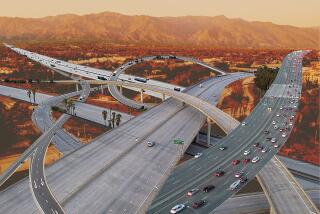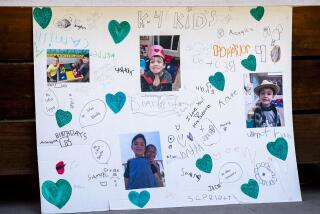Traffic taking toll on mood?
- Share via
As society hurtles forward in an age of instant messaging and one-click shopping, motorists paradoxically find themselves moored between bumpers for hours a day, with a psychic toll that experts are still trying to tally.
Dr. Laura Pinegar, a Long Beach psychologist who treats depression and panic disorders, hears a growing number of complaints about traffic anxiety in her practice.
“If you’re stuck in traffic, there’s a feeling of being out of control,” she said. “You can be at a dead standstill on the freeway, but amped up from the day, thinking, ‘I gotta get home. I gotta get the kids. What if I don’t get to day care before it closes?’ ”
In several studies on commuter stress, UC Irvine psychologists Raymond Novaco and Daniel Stokols made a surprising finding. Though they hypothesized that long commutes would be more stressful for hard-charging, Type A personalities than for mellow Type Bs, it turned out that the opposite was true. The reasons: The hard-chargers exercised more control over their lives. They had picked homes they liked and jobs that absorbed them. In traffic, they thought about work. The mellow drivers, on the other hand, thought about being trapped in traffic.
According to one study, women with long-distance commutes who drive alone are in the demographic group that suffers the greatest commuting stress. Pinegar said she has had some success in encouraging drivers to think of their commute as a buffer zone between work and home. “Especially mothers with large families,” she said. “They think, ‘This is my time to mellow out, maybe listen to the radio, get books on tape.’ ”
How gridlock makes us feel depends on what we tell ourselves about the experience, says Ronald Nathan, a psychologist in Albany, N.Y., who has treated both perpetrators and victims of road rage.
“Some people say, ‘Great, I can kick back and listen to some music,’ ” Nathan said, but others feel like life is passing them by. “We can start to over-generalize by saying, ‘My life is worthless. All I am is somebody who gets into a piece of metal and goes from one place to another.’ ”
For Leon James, a professor of psychology at the University of Hawaii, a lifetime’s academic pursuit began 25 years ago when his wife told him his driving scared her. She pointed out that he switched lanes before he looked, took curves too fast and raged against other drivers.
The rebuke stung his pride but got him thinking -- and led to his pioneering role in the small academic field of the psychology of driving. He began by asking his students to carry voice recorders to monitor their responses on the road, and learned that they were no strangers to rage -- particularly when cut off, tailgated or stuck behind slow cars in the fast lane. James said studies have found little correlation between motorists’ personalities inside and outside of the car. Road rage can overtake those who are models of agreeability at home or at the office.
“People tell me, ‘I’m amazed at myself. I’m not an aggressive person. I’m not this way. Why do I feel this way?’ ” James said. He has concluded that asphalt aggression is not an anger-management problem but one of socialization -- people absorb their driving mores in the back seat at an early age, watching grown-ups curse, pound the steering wheel and cut each other off.
Even as kids learn self-control on the playground, he said, they are taught the opposite on the road. “What we need is traffic emotions education starting in kindergarten,” he said. “You can’t just act the way you want.”
--
christopher.goffard @latimes.com



